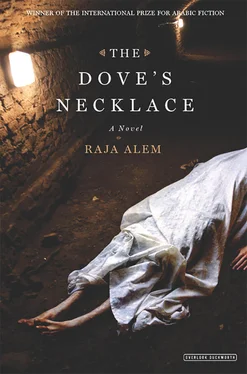She began reading out the titles of the works and Rafi realized she was speaking Arabic. “ The Incoherence of the Incoherence and The Long Commentary on the Metaphysics of Aristotle . Both by Averroes, the twelfth-century Cordoban philosopher, physician, and theologian who wrote about the immortality of the human mind through its connection to the effective mind, and the effect of that mind upon it. We still hold to his belief that we will all be resurrected in a more perfect body. I like to sum it up by saying that our open minds and hearts are the gateway to absolute knowledge and absolute existence!” She took a breath then moved to the next shelf, reciting title after title.
“But I promised to tell you about al-Shaybi … He was kidnapped by a Portuguese pirate ship on the shores of the Red Sea and brought to Iberia, where he finally escaped and made his way to Toledo. Poor al-Shaybi spent his life here as a busking storyteller, recounting stories of Aden and the women of Solomon’s Seal, who were all born with an outline of the moon on their palms, to children. He acted the stories out again and again without ever getting tired, and if you listen carefully, you can still hear the echo of his stories in the city’s walls and hills …”
Rafi and Nora strained their ears; they could no longer tell whether it was the woman speaking or the echoes of al-Shaybi’s tales echoing off the walls: “My mother was descended from the line of King Solomon and Queen Bilqis, like everyone else in the village of Solomon’s Seal. The daughters of the Seal are born with a moon on their palm, which they never close in a stranger’s face, because they believe that if the moon ever falls or is crushed, a fire will spread northward from Aden to clutch the whole of the Arabian Peninsula in its fiery grip, heralding the Day of Judgment.” With his thin teenager’s voice, al-Shaybi continued his story as the woman flitted from book to book.
“My father was the great-great-grandson of the man who bore the key to God’s House on Earth, the Kaaba in Mecca, and he went to Solomon’s Seal to search for the stolen key to the Kaaba. He settled there after falling in love with the moon-shaped birthmark on my mother’s hand. I was born there, on the mountaintops of Happy Yemen.”
The woman interrupted the echoes of the past to continue in a hoarse voice. “Al-Shaybi spent his nights in the mosque, withdrawn into the apse drawing the doors that I showed you. He was about my age, and he used to visit me to ask me about my ancestor Joseph ibn Nagrela’s journey to Aden, and they’d both sing with the same magical voice, lamenting the love they had found in the hands that bore the moon, which meant they’d both come from the same Aden. Sometimes when I looked at al-Shaybi’s head bent over those doors, it felt like he and my ancestor were one and the same. Joseph ibn Nagrela was reincarnated in al-Shaybi …” She held her breath, listening to the echo of her voice.
“Al-Shaybi never stopped coming here. I used to think he was in love with me, but he was actually coming to sift through every single poem that Joseph ibn Nagrela had left behind, believing that the key had been smelted and cast in poetry, and that he would find it hidden in a single verse … He and I went through every poem Joseph ibn Nagrela brought back from the temple of Almaqa, hoping we might find an image of the key. Here, look.”
She opened a yellowed manuscript in front of them. “This is a collection of the poems of Joseph ibn Nagrela, who was moved to write poetry by love.”
The room got darker as the woman continued talking. The two tried to focus on what she was saying, hoping that she might finally get to the point of all this. Nora felt lost amidst the cascade of words; she imagined figures in nuns habits slipping into the cellar and watching them surreptitiously from behind the shelves.
“I buried half my life in these poems, and ruined my sight. I remember one night, the night of my fifteenth birthday, when al-Shaybi and I were leaning over our work with our foreheads touching, we were so tired after hours of reading and re-reading a single line of a long poem in search of the key that we fell asleep right there. The line was: Exile is the ink in the book of God with which every straying soul is written and in which every soul searches for a mouthful of bread . That poem and the promise it carries returned to me when I saw your face this morning, Nora.” The deranged gleam in her eyes shone on Nora’s face.
“I dreamed of your face. When they introduced you, they said ‘This is the one who fled from the ink of doves and pigeons, the one who was delivered from the greed that surrounds the House of God.’” She brought the lamp closer to Nora’s face. “In my dream, a war waged around you and over you. That’s what brought you here. As if you were kidnapped.”
Frozen as if made of marble, each squeezing themself against the other’s ribs, Nora and Rafi stared aghast at the face that wouldn’t stop talking.
“I spent half a decade dreaming of you. Your face harassed me every single night, and then you suddenly disappeared. You were absent from my dreams for another half-decade. How naive was I to think that I could ever forget your face. I did forget it, but this morning, your features looked familiar to me. It just goes to show that even the lucky ones in our midst scarcely notice when they meet their dreams walking down the street.”
Her gaze bored through Nora as she repeated her words, slower this time and with a crazed edge. “I dreamed you in war.” Nora’s face was drenched in the purplish glow from the old building’s night-soaked stone walls. “In fact, the whole world awaits war …” She shifted her warning gaze back and forth between them, impressing her fear on them.
“In our books we call him the Savior, the one who will appear to lead us into the war that will open the door between the four rivers of Heaven and allow them to flow on earth, running together as one, purifying the earth before the descent of the Messiah, peace and glory be upon him, who will unite humanity in peace and the word of God, the word that will resurrect the dead and transform your deserts into a Cordoban paradise.” She took Nora’s hand, spreading it against her own left hand, and closed her right hand over the poems.
“We’re all hiding our faces behind other faces, but not all faces are burdened with as many contradictions as yours. I see fortune and death in yours. I’ve dreamed about you so often — too often. So often that your features became tattered and worn.” She said it like an accusation.
Rafi and Nora looked like wax figurines in the dim light of the cellar, like the miniature models of sheep clustered around the infant Christ on the shelf. The air moved thickly when the woman reached out for a book on the table and opened it. It was about the gardens of the Alhambra.
“I knew you by your smell. The measure of a garden in al-Andalus was always its sound and its scent. That’s why our ancestors always made sure to plant great beds of scented flowers where nightingales, peacocks and doves would roam. Soon, your deserts will flow with perfumes and songs, as one body from one word.”
She stared piercingly at them, urging them to say something. Rafi shook his head. “The fall of Cordoba was the fall of the whole world’s dream.”
The woman looked toward the door in surprise; this time, Nora was sure there was a figure in a nun’s habit moving about, watching them through the shelves. The woman raised a trembling hand and picked up a small book, which she handed to them.
“Take a little of me with you in this book, even though you’ll never be able to read it because it’s in Hebrew. It’s a copy from a manuscript of Ibn Hazm’s book The Necklace of the Dove , a book about love: love as a door that opens at first sight onto the heart of the other, love as a place of being, as a race, as blood that flows through us, bringing all bloodlines together, giving us an eternal, heavenly body … A look of love is magic capable of transcending masks and veils. It is the key or the door to a supernatural creature hiding forgotten inside of us.” She fell silent for a moment, listening to the darkness as if straining to follow the sound of footsteps.
Читать дальше












